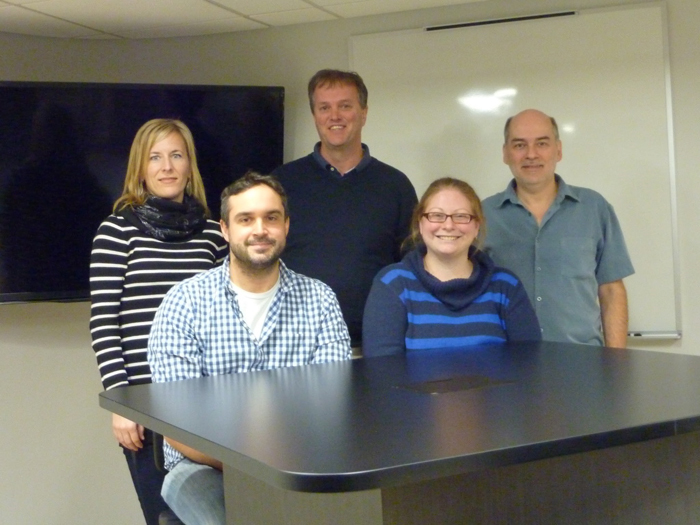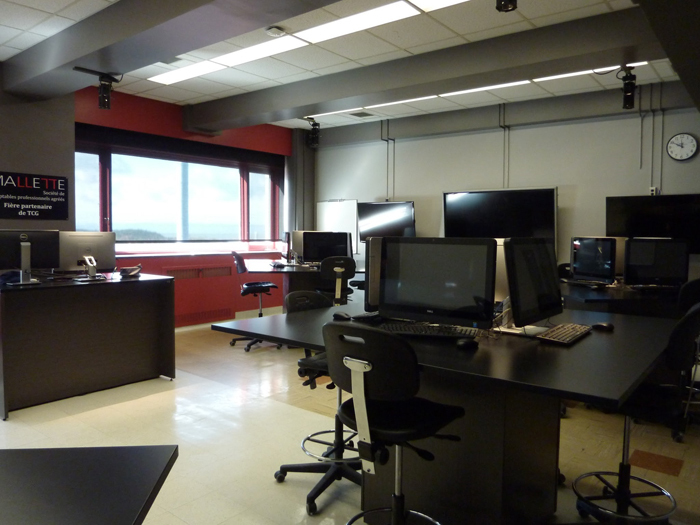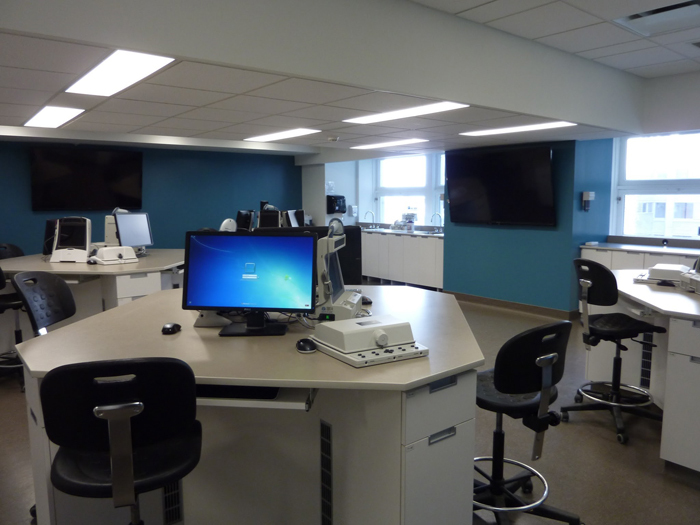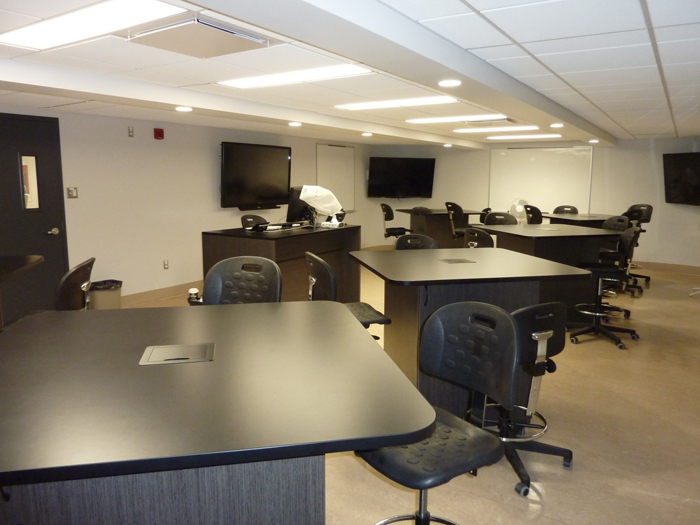Learning Centre for Pedagogical Application of ICTs: An innovative support model

The Learning Centre committee in 2015-2016 (from left to right): Josiane Martin, Jonathan Bélisle, Martin Bérubé, Isabelle Deschamps and Michel Forget.
On October 19, 2015, I set off towards the CEGEP de La Pocatière, where Martin Bérubé was waiting to show me around the college and to introduce me to the teachers on the new committee for ICT integration.
In French, the committee is called the CAPTIC or the Centre d’apprentissage en application pédagogique des TIC (Learning Centre for Pedagogical Application of ICTs) and it is made up of a small team of teachers who report to the Director of Studies. The committee is made up of:
- Martin Bérubé, Pedagogical Counsellor and in charge of the François-Hertel Library
- Jonathan Bélisle, Teacher in Physical Engineering Technology Program
- Isabelle Deschamps, Teacher in Animal Health
- Michel Forget, Teacher and Program Coordinator for the Computer Sciences Program
- Josiane Martin, Teacher and Program Coordinator for the Accounting and Management Program
The mandate of the CAPTIC consists of informing, training and supporting teachers of the CEGEP de La Pocatière who wish to integrate ICTs into their practice.
Actions of the committee also aim at informing managers, professionals and support staff of the technology needs of teachers and to provide them with knowledgeable opinions for them. With this objective in mind, the committee proceeds with the collection and the analysis of training and support requests coming from the teachers. In return, the committee proposes workshops to offer the training and the support asked for. A connection must be made with the computer services department, but the committee ensures the pedagogical aspects of the use of the technologies.
The committee also has a mandate of monitoring technology in education. This responsibility is the job of Martin specifically, who uses social media and aggregation tools (such as Paper.li and Scoop.it) to disseminate information to the teachers:
When I created the blog “Infomaîtres”, the initiative had not immediately been understood by everyone. Several teachers worried about an overload of information. I limit myself to one post per week to summarize the current events. Sometimes, I bring publications to the attention of people or departments in particular when I believe they could be of interest to them. I always select information by wondering: does this have potential or could it be of interest to the college? For example, the Real Life Story about Liki Lab and the Featured Report about Google Apps, published recently on Profweb, reaches the interests expressed by teachers.
Attuned to the Techno-pedagogical Needs of Teachers
Martin and I arrive at the CAPTIC room to begin our interview with the team. First, we enter the library and make our way to the mezzanine. Large working tables with outlets for network and electrical connections are positioned on either side of the main room. Martin explains to me that the CEGEP is progressively making the digital shift: programs are leaning towards BYOD and several classrooms are equipped to facilitate collaborative and active learning. The first mandate of the CAPTIC committee consists of helping and supporting teachers through this technology transition.
The upper floor groups together rooms for various help centres of the CEGEP in the following disciplines:
- French
- Mathematics
- English
- Biology and Chemistry
- Philosophy
On account of its vocation of help and support, it seemed logical that the CAPTIC would be located in the same area.

The CAPTIC room.
A Little History about the CAPTIC
Martin and Michel tell me the history of the CAPTIC. Its creation is very recent, as it is just starting its 3rd year of activities. In the beginning, the Director of Studies entrusted Martin with the mandate of verifying the needs of the teachers of the CEGEP de La Pocatière and the Centre d’études collégiales de Montmagny in terms of techno-pedagogical training and support.
Following the gathering and analysis of needs realised by Martin, the Director of Studies determined that the setting up of a learning centre would be a good way to provide teachers with the necessary information and support. In 2013, the CEGEP de La Pocatière gave the go ahead for the CAPTIC.
- The first year, the committee members were selected by a process of nominations: members were elected according to their aptitudes, their knowledge and their experience. This is how Michel and Isabelle began their implication with CAPTIC.
- The following years, the recruitment has been done on a volunteer basis: teachers interested in becoming part of the committee were invited to submit their candidature, in which they presented their area of expertise and the ICT project they desired developing more or experimenting with during the year. Jonathan and Josiane joined the team during the fall 2015 semester.
In the interest of transparency, the CAPTIC also equipped itself with a database, of which Michel is the creator, in order to document:
- The compilation of all the activities
- Types of requests received
- Names of the people met
This information is used for the annual report of activities, to summarize the realisation of the determined objectives from the work plan.
The data base is a tool that allows us to become aware of the magnitude of work we have accomplished. It also holds surprises for us. Upon reading the annual report of the activities, we noticed that we had done far more than what had been expected from our work plan, and we had found our objectives very ambitious at the start! For us, it is a source of gratification and pride.
The committee members benefit from release time, 0.1 ETC per year for their work with the CAPTIC. The projects are realised with collegiality between the members of the committee. Martin ensures the link between the committee and the ICT Committee of the CEGEP and the Director of Studies. He also represents the CEGEP within the IT REP Network.
The CAPTIC team also plans on experimenting with active learning classrooms with several groups of students. The CEGEP has equipped itself with several classrooms set up with collaborative work stations, especially for the programs of Accounting and Management and Audioprosthesis.

Active learning classroom in Accounting and Management.

Active learning classroom in Audioprosthesis
The CAPTIC has also made a multifunctional room available to the teachers, with workstations set up for collaborative work. The teachers can reserve the room and students bring their own device. Each workstation is equipped with a white board and a projection screen. The teacher can control the brightness in the room and the sharing of screens from different mediums. The teacher’s station is also equipped with a tactile screen and a document camera to display small objects on the screen, which allows the teacher to avoid crowding around their desk. This type of camera is used in particular in the Audioprosthesis program during demonstrations involving the manipulation of small objects.

The multifunctional room at CEGEP de La Pocatière
Custom-designed Training for Teachers
The committee offers training when teachers make a request. Because it is difficult to select a time to hold a workshop that is convenient for everyone, the training offered to teachers usually takes the form of 1-on-1 accompaniment. It has even happened that a teacher received training from 2 or 3 committee members at the same time.
To satisfy my curiosity (and yours!), Michel listed the most frequently requested training topics:
- Interactive whiteboard
- Moodle Platform
- Notability application
- Clickers
- Google Forms application
Thanks to the diversity in expertise, disciplines and personalities that we have in the CAPTIC team, teachers can choose to work with a mentor that suits their needs and preferences.
A Help Centre for Students, by Students
In the winter 2014 semester, a student version of the CAPTIC was born. The students in the course of Communication and Support (Communication et soutien) in Computer Sciences assign themselves a time slot to ensure a presence in the library of the CEGEP. Under the supervision of Michel, they dedicate their availability hours to tutoring by answering the questions of other students, in person or by email. There is one email address that centralizes all of the questions and requests for support that are sent to the tutors. Each intervention is then entered into a data base, just as the CAPTIC does. Since fall 2015, the student version has become the Computer Help Centre (Centre d’aide en informatique). Their office is located on the first floor of the library.
A Rewarding Experience
When I ask the CAPTIC team if they have the impression that their efforts have a positive impact on the rest of the college, all 5 answer me, with modesty, that they believe they do. Even if they don’t presume to have a college-wide influence, nevertheless the team finds it gratifying to have the opportunity to experiment and help the transformation of the practice of some of their colleagues, little by little. Communication circulates well between the different levels of intervention, from the support staff to the administration, and the support that the committee receives facilitates the start-up of technological projects.
Word of mouth has also played a role: Jonathan highlights that several teachers in his department also started to use Google Drive with their student groups. The CEGEP is in the process of obtaining Google Apps for Education; while waiting, the teachers in their department share the list of Google accounts that their students use in their courses. On a small scale, this practice favours a consistency within the Physical Engineering Technology Program.
The time investment required to master a new tool or a new approach is generally what creates the most resistance from teachers. With the committee, we also have a role as a facilitator. We make the first experiments and the first selection of available resources. We then share our knowledge with our colleagues. From that point, there is a momentum.
What Does their Involvement in the Committee Bring them, from a Professional and Personal Perspective?
What motivates me to be involved in the committee, is the opportunity to share my knowledge, tricks and discoveries that make a difference in the work of other people. In addition, being the program coordinator for Computer Sciences, the student IT committee is a wonderful opportunity for my students in computer sciences to offer help to others.
One of my main motivations is the fact that our teaching efficiency can be easily increased with the help of ICTs. For example, the creation of video tutorials or demonstrations helps me in particular with my teaching. On a professional level, it is the pedagogical monitoring that helps me the most. It gives me the time to try new technologies and to verify if it would be applicable in my teaching. For example, I am testing the use of Google Drive in the laboratory for my Optics course, in order to allow the students to work simultaneously on the same document.
Through the activities of monitoring, experimentation, training and supporting other teachers of the CEGEP, the committee participates in the promotion of ICTs in the CEGEP. It allows exchanges regarding ICT initiatives in our college, but also elsewhere in the network, especially from my engagements as the ICT representative (REPTIC). The committee favours the circulation of ideas and techniques that both teachers and students benefit from.
I wanted to be part of the committee to be at the heart of the action that has to do with the use of technologies from a pedagogical point of view. The program of study that I teach in exerted a great deal of effort to create an environment that favours the use of technology in the classroom and to equip itself with the necessary tools (active classroom and iPad project). It proves to be vital to put in the time and effort to adapt my pedagogical activities, to experiment in class and to share this with my colleagues. The committee is a place where I can discuss problems I have encountered, where I can get inspired by the accomplishments of my peers. It is an opportunity to be in contact with other teachers, and beyond the support that is offered, there is an exchange of ideas that furthers the ideas, and creates new projects. The students also benefit from these innovations and demonstrates the interest of going further… like a ripple effect!
The committee has allowed me to find the time in my schedule to lend a hand to my colleagues and students in mastering the use and integration of ICTs that I would not otherwise have. In carrying out this support role, I have noted that there is a real need. The people who are helped are very appreciative; it is motivating to see the enthusiasm they express when they realise that the use of a certain tool was not as complex as they thought and that it will be useful to improve their teaching and efficiency. Another encouraging element is the time dedicated to experimenting which becomes more profitable, as it is not just me who is benefiting: other teachers are having their needs met as well. In addition, the opportunities to share are as interesting for me as those people I am accompanying.
Teacher Testimonies
I have used the CAPTIC several times. The availability, welcome and the way in which the information is given in its simplest form is what I have taken away from my meetings with the welcoming and dynamic staff. The centre is a wonderful initiative and it is essential in order to help professionals to appreciate ICTs.
I participated in the training on clickers with Isabelle. In addition to providing me with several tricks and proposing a panoply of activities, Isabelle helped me when I had a few difficulties. Her sincere interest and professionalism gave me the desire to return to the CAPTIC for the following training seminars. She also gave me the desire to delve deeper into the development of stimulating activities thanks to the clickers.
For me, I appreciated the services provided by the CAPTIC because it is an important support service for my teaching practice. It is made up of a front-line service, in direct link with our professional reality, that provides an efficient help service to teachers; it is possible to have assistance from the CAPTIC without having to endure a heavy and laborious process. Another substantial advantage of the CAPTIC is that is favours exchanges between teachers. In my opinion, these discussions provide one of the most efficient ways to learn and develop our skills as teachers. For example, during the last semester, my colleague informed me about the different possibilities of Google Drive. This semester, I have taken advantage of this tool to share documents with my students in an efficient way.
Being a new teacher, help from Josiane has allowed me to save precious time. In fact, she explained the Moodle system to me by presenting several templates to use in my different courses. Her practical approach has greatly helped me create my own group on the platform by using various tools. Thank you to Josiane and the CAPTIC team!
The slideshows used in my course notes and those made available to students were very bulky and used a lot of storage space. I therefore needed the advice of Isabelle to modify the size of the images incorporated into my presentations, without loosing the quality (digital viewing and printed on paper). Isabelle knew how to answer to my needs perfectly, and this was done quickly at the beginning of the semester.

